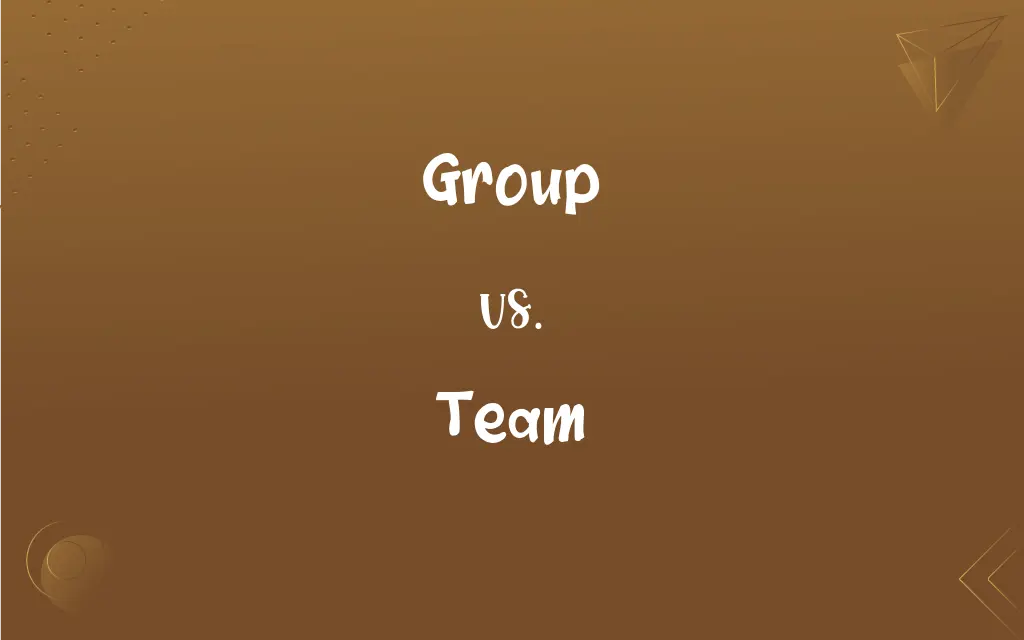Group vs. Team: What's the Difference?
Edited by Aimie Carlson || By Harlon Moss || Updated on October 16, 2023
A "group" refers to a collection of individuals, while a "team" denotes individuals working collaboratively towards a common goal.

Key Differences
Both "group" and "team" describe assemblages of individuals, but their underlying purposes and interactions diverge significantly. A "group" essentially means a number of people gathered together, possibly with a shared characteristic or interest. Meanwhile, a "team" implies a deeper connection, with members pooling their skills and efforts towards a shared objective.
When considering functionality, a "group" may not necessarily act in unison. Their gathering might be more passive or coincidental. On the other hand, a "team" typically involves collaboration, coordination, and communication, aiming for a combined result.
Delving into the dynamics, within a "group", each individual might retain a more independent stance, sometimes leading to less structured interactions. However, in a "team", there's usually an interdependence, as each member's role or function is critical to the overall outcome.
An example might elucidate the contrast: Imagine a "group" of people waiting for a bus; their primary commonality is their presence at the bus stop. Conversely, consider a basketball "team", where players actively work together, strategizing and supporting each other to score points and defend against the opposition.
In essence, while both "group" and "team" encompass gatherings of people, the depth of their synergy, purpose, and interaction sets them apart. A "group" might be more about presence, whereas a "team" is fundamentally about partnership and performance.
ADVERTISEMENT
Comparison Chart
Definition
Collection of individuals.
Individuals collaborating towards a common goal.
Collaboration Level
May or may not collaborate.
Collaboration is inherent.
Interdependence
Less to none.
High interdependence among members.
Purpose
Can be varied or non-specific.
Defined common objective.
Structured Interaction
Interaction might be unstructured or casual.
Structured interactions based on roles and responsibilities.
ADVERTISEMENT
Group and Team Definitions
Group
A classification based on shared characteristics.
He belongs to the group of Romantic poets.
Team
Two or more animals harnessed together.
A team of horses pulled the carriage.
Group
A periodic table column of elements with similar properties.
Oxygen belongs to the chalcogen group.
Team
A group of players forming one side in a competitive game.
The team practiced hard for the upcoming match.
Group
A number of people or things gathered together.
A group of tourists visited the museum.
Team
A set of matching clothing or equipment.
He wore the baseball team's official uniform.
Group
Multiple musical artists performing together.
The rock group played their latest hits.
Team
A group of people working together.
Our project team meets every Tuesday.
Group
A set with defined algebraic operations.
The set of integers with addition is a group.
Team
To come together to achieve a shared goal.
They teamed up to start the new venture.
Group
An assemblage of persons or objects gathered or located together; an aggregation
A group of dinner guests.
A group of buildings near the road.
Team
A group on the same side, as in a game.
Group
A set of two or more figures that make up a unit or design, as in sculpture.
Team
The members of a team who are actively playing at a given time
After a stellar performance in last week's game, the shooting guard was promoted to the starting team.
FAQs
Can a "group" evolve into a "team"?
Yes, a "group" can evolve into a "team" when members start working collaboratively towards a shared goal.
Is every "team" essentially a "group"?
Yes, every "team" is a "group", but not every "group" functions as a "team".
Are roles defined in a "group"?
Not necessarily. While roles might be defined in some "groups", they're more typical of "teams".
Can animals form a "group" or "team"?
Yes, animals can form "groups" (like a pack of wolves) and can also work as a "team" (like a team of sled dogs).
What's the significance of trust within a "team"?
Trust within a "team" fosters open communication, collaboration, and enhances overall team performance.
Is a "team" always goal-oriented?
Typically, a "team" is formed with a specific objective or goal in mind.
How does a sports "team" function?
A sports "team" trains, strategizes, and competes together to win matches or tournaments.
Do "groups" always have leaders?
Not always. While some "groups" might have a designated leader, others function without one.
Can the size of a "group" or "team" be just two people?
Yes, both a "group" and a "team" can consist of as few as two people.
Is mutual respect more pertinent in a "team" than in a "group"?
Mutual respect benefits both "groups" and "teams", but it's often more crucial in "teams" due to collaborative efforts.
Why is communication crucial in a "team"?
In a "team", communication ensures coordination, understanding of roles, and effective collaboration towards the goal.
Can "group" dynamics influence individual behavior?
Yes, "group" dynamics can influence an individual's behavior, decisions, and perceptions.
What's the key factor determining a successful "team"?
A successful "team" often hinges on clear communication, mutual respect, and effective collaboration.
How important is leadership in a "team"?
Leadership plays a pivotal role in guiding a "team", ensuring coordination, and achieving objectives.
Do all "teams" need regular meetings?
While not all "teams" may require regular meetings, consistent communication is essential for alignment and coordination.
Can a family be considered a "group" or "team"?
A family can be seen as a "group" based on relationships, and when they work together towards a goal, they function as a "team".
Can you give an example of a professional "group"?
A "group" of researchers might collaborate occasionally but work on individual projects.
Can there be conflicts in a "group"?
Yes, conflicts can arise in any "group" due to differences in opinions, interests, or personalities.
Does every member of a "group" contribute equally?
Not necessarily. In a "group", members might have varying levels of involvement or contribution.
What's the main advantage of working in a "team"?
Working in a "team" allows pooling of diverse skills, shared responsibilities, and more creative problem-solving.
About Author
Written by
Harlon MossHarlon is a seasoned quality moderator and accomplished content writer for Difference Wiki. An alumnus of the prestigious University of California, he earned his degree in Computer Science. Leveraging his academic background, Harlon brings a meticulous and informed perspective to his work, ensuring content accuracy and excellence.
Edited by
Aimie CarlsonAimie Carlson, holding a master's degree in English literature, is a fervent English language enthusiast. She lends her writing talents to Difference Wiki, a prominent website that specializes in comparisons, offering readers insightful analyses that both captivate and inform.































































